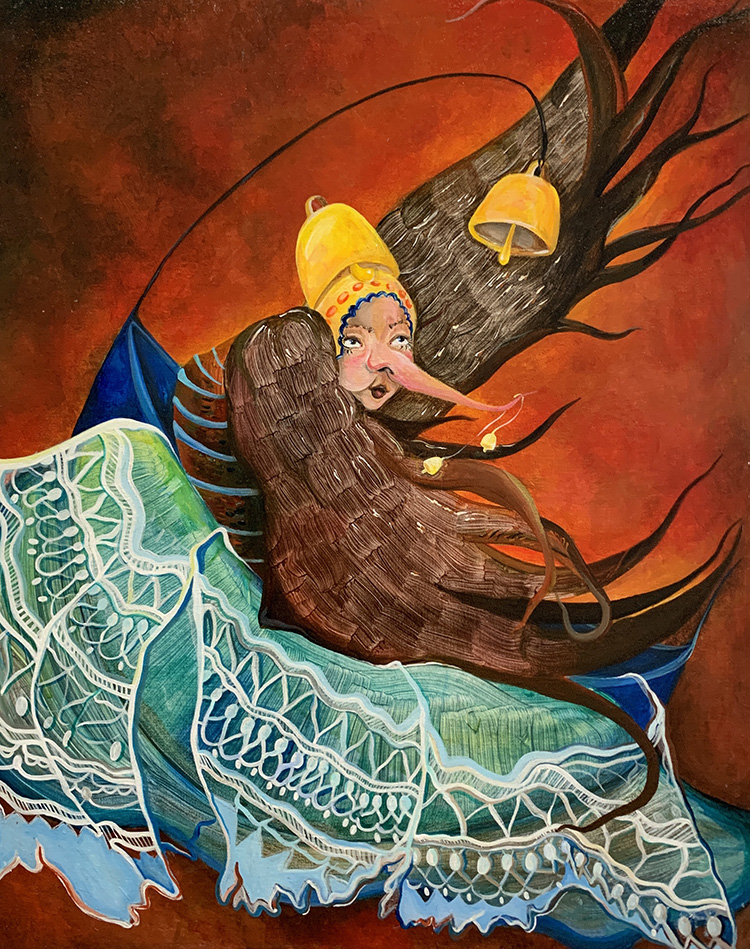Student Sofia Liashcheva: Honoring my Russian culture through art and activism
As a Russian immigrant she expressed herself through art. As a Berkeley student, she speaks out against the Ukraine War
March 15, 2022
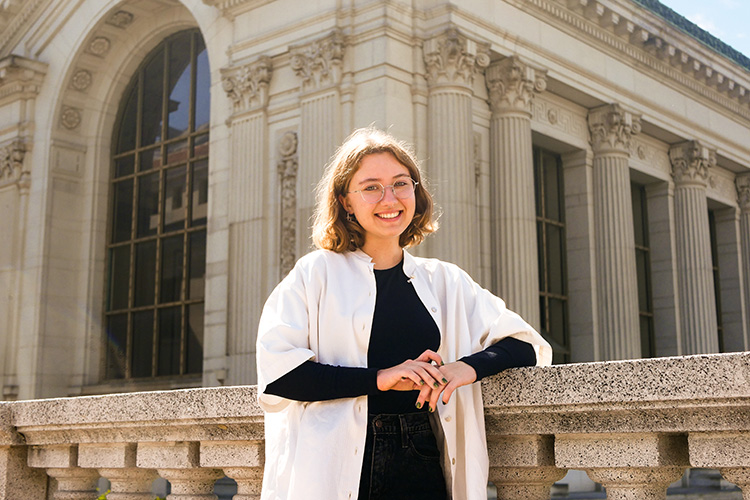
As a Russian immigrant experiencing economic woes, Sofia Liashcheva expressed herself through art. As a UC Berkeley student, she speaks out against the war in Ukraine: “There is no excuse for the war, and I will do what I can to speak out against it. Because I stand with Ukraine.” (Photo by Avannya Sinha)
This I’m A Berkeleyan feature was written as a first-person narrative from an interview with student Sofia Liashcheva, a first-year cognitive science major. Have someone you think we should write about? Contact [email protected].
In Siberia, winters are cold. I grew up in Krasnoyarsk, the third biggest city in Siberia, and we’d get close to a foot of snowfall every day, with temperatures going below -20 degrees Fahrenheit. It was hard to travel anywhere. Even trying to walk around, it was easy to fall over or get stuck in the snow.
But people would find a way.
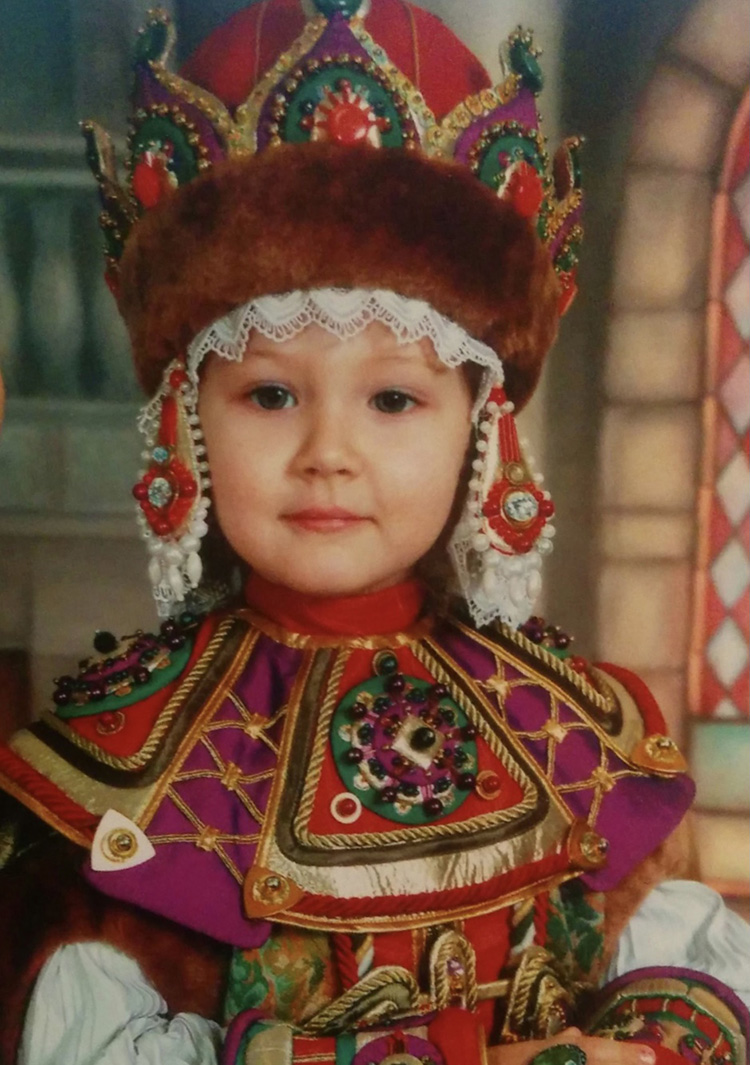
Sofia as a child wearing traditional Russia dress in Siberia. (Photo courtesy of Sofia Liashcheva)
If you are from Siberia, you never say that you’re from Russia, you say you’re from Siberia. This is how separate I felt from other parts of Russia growing up. Siberia is just very different culturally. During wars, a lot of people from different backgrounds would be sent to Siberia by the Russian government, so we have a lot more ethnic and cultural diversity there.
That’s something that people in Moscow didn’t experience as much.
Krasnoyarsk is one of the most polluted cities in not just Siberia, but all of Russia. Soviet-era factories producing aluminum and other metals pollute the atmosphere, and because the city is located between the mountains, it is hard for the air to circulate, so it just stays in one place.
As a child, they would have “black sky regime” alerts to let us know when to stay indoors. I remember I’d look up, and parts of the sky would be covered behind thick, dark smoke. It was very upsetting, and it sometimes felt like I was trapped.
It was hard to see myself being anywhere else but Siberia: It was the only place that I knew.
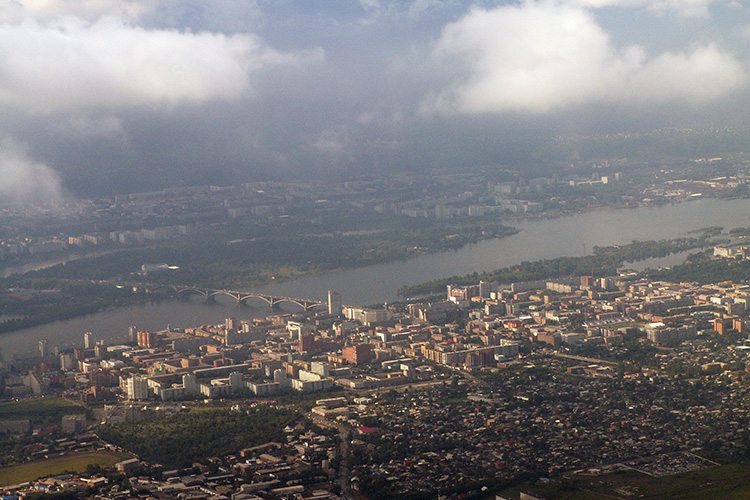
Krasnoyarsk in Siberia is so polluted that “black sky” warnings are the norm. (Photo by Zmey Kaa Kobra/Wikimedia)
When the Soviet Union collapsed in 1991, economic reforms brought a lot of political corruption and stealing of money. That impacted my grandfather, who was a firefighter, and my grandmother, who was an accountant. The economy became so bad, the pay for respectable jobs like theirs became so low.
I was raised by a single mother, and we lived in a two-bedroom apartment with my grandmother. It was a typical rectangle-shaped complex built during the Soviet era. As an only child, I’ve never had a real relationship with my biological father. I’d see him maybe a couple times a year, and he would never help us out financially.

Childhood photo of Sofia, center, with her aunt, grandmother and mother, right. (Photo courtesy of Sofia Liashcheva)
Throughout my childhood, my mom worked for a business that builds swimming pools. When Russia invaded Crimea in 2014, our country entered a very bad economic crisis. My mom had to work in the same position, for the same company, with the same pay, for years and years. There would even be delays in her payments because the company wouldn’t have enough money to pay their employees.
Despite those struggles, I still have fond childhood memories living in Siberia.
I get nostalgic when thinking about playing with my friends in the snow and on old Soviet playgrounds with tall metal slides and swings. We’d go to my place and have some warm Russian tea, and the bright red color of my grandmother’s borscht (beetroot soup) is something I always looked forward to seeing after playing in the snow.
Some kids would watch television or YouTube a lot, but I didn’t. I was very interested in drawing and creating art.
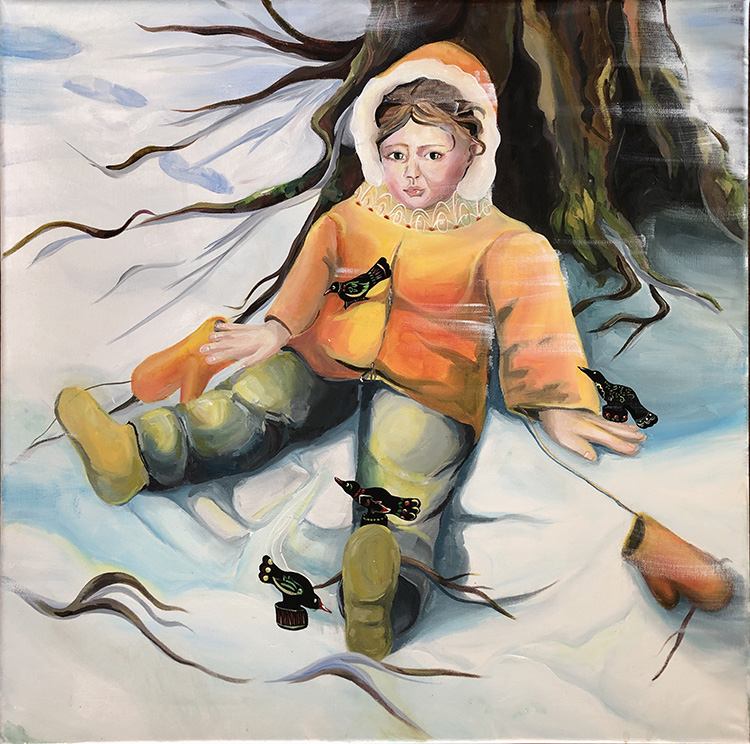
A recent childhood self portrait of Sofia sitting in the Siberian snow. (Photo courtesy of Sofia Liashcheva)
When I was 10, I began attending an art academy. In the summers, we would go outside and bring a bunch of foldable chairs to sit on, then do paintings or still drawings of landscapes, churches and other landmarks we saw in the city. We also had classes focused on sculptures, art history and composition.
While we learned the art mechanics of replicating things around us, a lot of times it felt like we didn’t get to express ourselves. A lot of our teachers were educated in the Soviet Union, so they had this perception that art was a replica of what you see, and not what you can imagine.
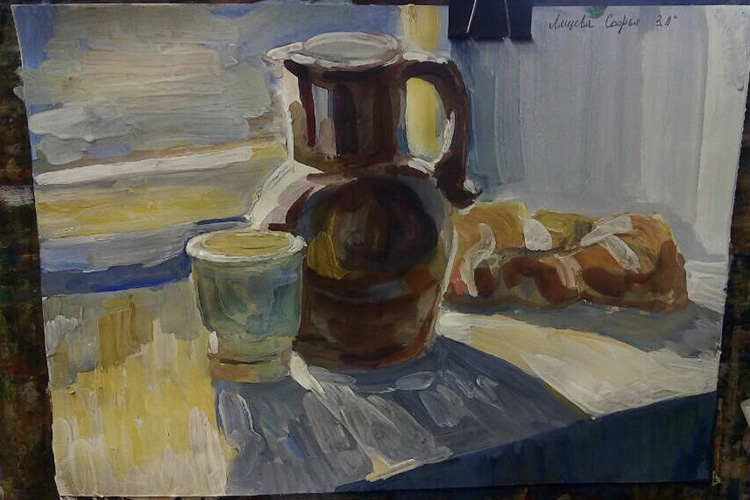
As a young artist Sofia said she was taught the mechanics of drawing and painting to replicate what she saw, as is captured in this painting of a cup and pitcher. (Photo courtesy of Sofia Liashcheva)
My experience is that the Russian education system, in general, does not want people to think for themselves. In order to do well on exams, you memorize a template of information. You don’t need to analyze or come up with your own opinion, you just have to memorize someone else’s.
To deviate from that system was not a good thing.
When I came out as queer, I was in middle school. I started dating a girl in my class, and we would hold hands and spend a lot of time together.
In many parts of Russia, being part of the LGBTQ community is looked down upon. It is so alien to some people, I was treated like I was from another planet. One teacher sent me to the school psychiatrist to talk to me about being queer.
And then she tried to convince me that it was bad, being who I am.
I think a lot of people in Russia try to hide their sexuality, or not mention it. But I wasn’t going to do that. So, I did get bullied often and lost a lot of my childhood school friends. But friends from my art academy were more open-minded.

A recent self portrait of Sofia: “In many parts of Russia, being part of the LGBTQ community is looked down upon. It is so alien to some people, I was treated like I was from another planet.” (Photo courtesy of Sofia Liashcheva)
I also had some amazing teachers that were different and challenged us, as artists, to think outside of the box.
When I was 14, during my last year of the art academy, Mr. Igor taught painting and was completely against this whole notion of just copying things through art. He would say, “If you want to capture what you see, just take a picture of it.”
Once, I painted a scene with farmers and pumpkins and replicated it perfectly. Mr. Igor got upset and told me to go wash the paint off in the sink and start over.
“You can do more than this,” he told me.
I painted the scene again and tried to give my own personal interpretation of it. I blurred the faces of the farmers, making them obscure, yet exaggerated. The pumpkins and other crops were oversized, and not one brushstroke was perfectly blended. It was revolutionary for me as an artist at the time, because it changed the way I perceived not only art, but life.
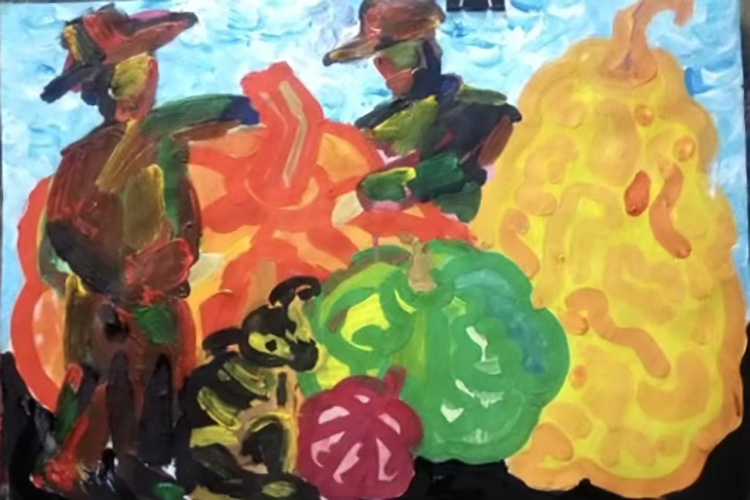
Sofia painted this for Mr. Igor’s class when she was 14: “It was revolutionary for me as an artist at the time, because it changed the way I perceived not only art, but life.” (Photo courtesy of Sofia Liashcheva)
It taught me not to be afraid to make mistakes.
When I moved to Los Angeles, I was 14. It was the first time I left Russia in my entire life. My mom was tired of being stuck in the same job with low pay for years. So, we lived in an apartment near Echo Park, where she worked as a maid for a while. But she eventually got a nice office job with a better salary and benefits. She also got remarried.
Starting high school as an immigrant in a new country, it was terrifying: like stepping into the unknown.
I didn’t know how to speak English, and I didn’t know a lot of the cultural things that typical American teenagers would know. I was able to get into a visual and performing arts high school in downtown LA, but walking around campus, it was really difficult even to simply ask someone where my class was. It was not a good feeling.
So, I would constantly study these English textbooks I had, like every day after school until bedtime. After a year or so, I became more comfortable speaking English at school, and it gave me more time to focus on developing as an artist.
Art school in the U.S. definitely encourages more creativity and self-expression than what I experienced in Russia. Teachers here would give me assignments where I basically could create whatever I wanted.
It really gave me an opportunity to explore what really interests me: Slavic folk art.
Having this freedom really helped me grow as an artist and also gave me a sense of comfort with the art community at my high school. I also would walk through the halls and see posters with rainbow flags on them, and I’d think to myself, “That is not something I would ever see in Russia.”
I felt like this was a safer environment for me to come out as queer without being afraid of losing friends or being treated different. It was very liberating, because even though I couldn’t relate to people on a cultural level, I could at least relate to people about this.
I felt like I belonged.
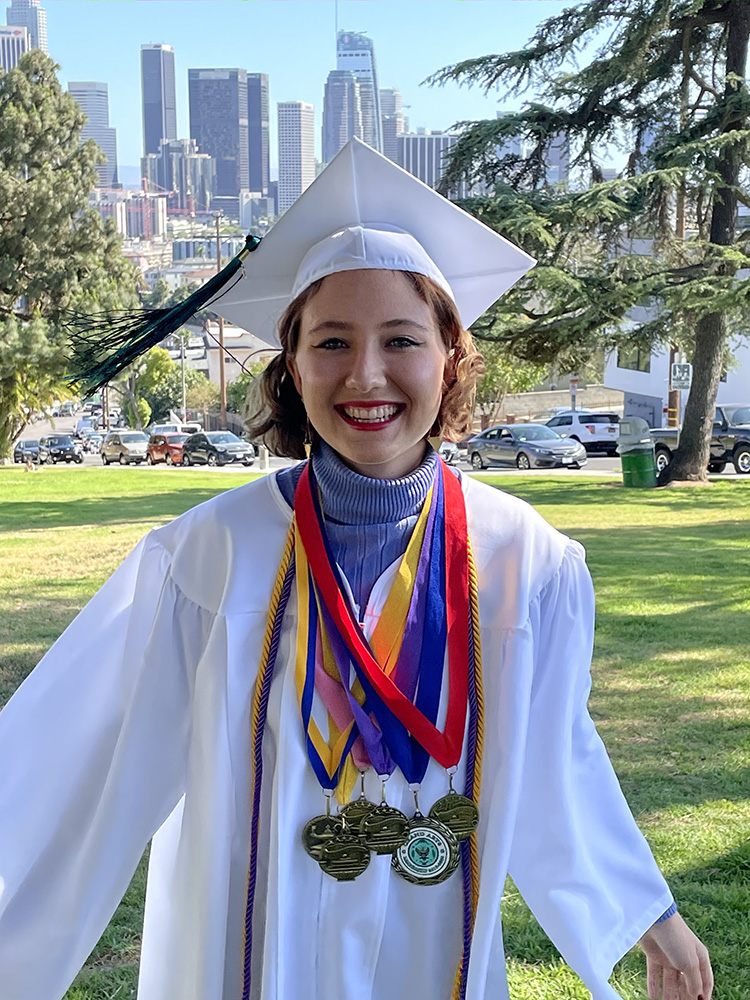
Sofia in Los Angeles the day she graduated from Ramón C. Cortines School of Visual and Performing Arts. (Photo courtesy of Sofia Liashcheva)
As a new freshman student at Berkeley, I am starting to feel that same sense of belonging here, as well. As a cognitive science major, I hope to continue to grow as an artist by combining what I am learning at Berkeley to find new ways to express and interpret my own art — on my own terms.
I love Russian people and Russian culture. And I definitely want to go back to Siberia to visit my family after I graduate. But I wouldn’t want to live there again. The economy is still so bad, and it would be hard to find a job.
And this war Putin has started with Ukraine, I am against it.
Everyone in Russia I have spoken to, my friends and family, don’t want this war and don’t understand the motive behind it. Some of them had no idea Russia invaded Ukraine.
The financial costs of the war are leaving very few resources for people in Russia that don’t have a lot of money. Prices are going to skyrocket even more, and everyday people will not be able to afford food or other basic things. But speaking out can get you in trouble in Russia.
Russians protesting Putin’s war are being put in jail because it is basically illegal to protest against the government. There are protestors as young as 10 years old being detained in Moscow, and I’ve heard from my friends in the universities that if you protest, you can be expelled from school.
So, people that oppose the war in Russia are starting to speak out more, albeit the consequences.

Ukrainian firefighters work at the site of a building in Kyiv that was heavily damaged during the early days of the Russian invasion. (Photo released by Kyiv City Council/Wikipedia)
There is much sadness I feel about this war. In Russia, there are a lot of families that are from Ukraine or have families that live there. There is so much culture Russians share with Ukrainians. We are intertwined in so many ways from our food, music and communities.
In a way, they are like our brothers and sisters, so it’s very heartbreaking to see people suffering and dying in Ukraine.
As a U.S. citizen, I still love my Russian culture and where I came from. But Russia’s leaders, I don’t think they represent anybody but themselves.

Sofia was recently visited by her mother, left, on campus: “My mom has always been there to support me. Coming to the U.S. has been life changing for us.” (Photo courtesy of Sofia Liashcheva)
So, when the war began, I marched on Sproul Plaza to protest because I, like many other Russians, don’t want people being slaughtered. There is no excuse for the war, and I will do what I can to speak out against it.
Because I stand with Ukraine.
As a student at Berkeley, I feel empowered that I live on a campus that gives us the freedom to act on what we believe in, without being afraid.
That is why, when I first got accepted to Berkeley, I cried. As an immigrant, I knew it was an amazing place to grow academically. But it wasn’t until now that I realized it’s also a place that has allowed me to honor my Russian culture through art and activism.

